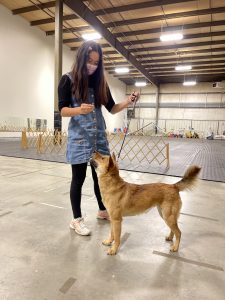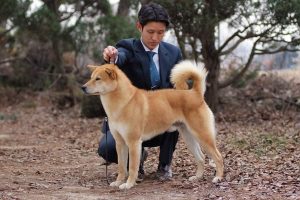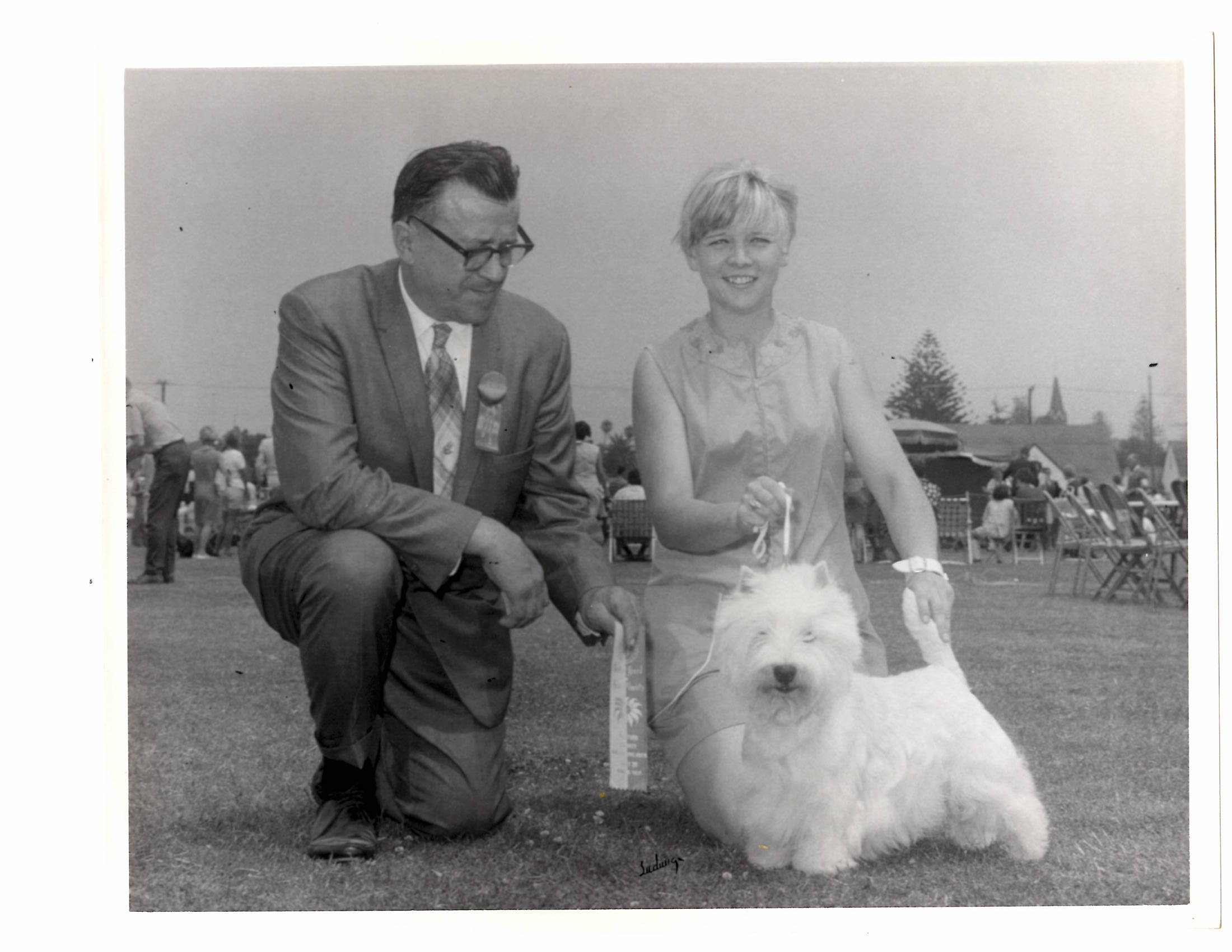485 — Korean Jindo: Independent, reserved, polite and serious

Korean Jindo: Independent, reserved, polite and serious

Hannah Yi and her Jindo practicing for Junior Showmanship competition.
Hannah Yi and Nichole Royer join host Laura Reeves to share information about the rare and fascinating Korean Jindo.
Developed on Jindo Island, off South Korea’s coast, as an isolated population of centuries old village dogs, the breed is a cultural icon in its home country. Renowned for its ability to find its way home, a feature memorialized in Korean culture, Jindo are dedicated hunting dogs and very serious about guarding their home.

Jindo in South Korea.
“They were developed as a pretty hardcore hunting and guard dog,” Royer noted. “They are generally used for hunting small game, but they also hunt deer and even wild boar in small groups. They are not a breed that developed hunting along with their owners. They actually expected Jindos to go out and catch small game on their own and bring it home.
“When they chased down something like a deer, and I should add the deer and the wild boar on Jindo island are not the size of the deer and wild boar we have here in the US. The deer are much smaller … a small group of Jindos would chase them down and then a couple of the Jindos would stay there to guard the deer, while one or two dogs went to find the owner.

Jindo in South Korea
“(They were) designed to go out, be able to think for themselves, be able to make their own decisions. They take their owner’s wishes under advisement, but really are not designed to go around saying ‘what can I do for you.’ It’s a partnership rather than being what the dog can do for their owner.”
“I visited Korea a couple of times as a child,” Yi said, “and in the neighborhood and a bit of the rural parts, you would see them outside … I always (had them) pointed them out ‘hey, that’s a Jindo dog.’ They’ve always been a really independent spirit. Even though I didn’t know much about them as a kid, I just knew that (they were) culturally ingrained in your knowledge.
“(The story in Korea is) there was this dog and it was a white Jindo dog … it lived with its elderly owner in the city. But one day the owner had to sell the dog. So it was really far away. Then seven months later, the dog appeared back to the owner’s house. It found its way home. So that’s just really stuck to a lot of people. There are a lot of children’s books and merch made about that and it was just really interesting to me. I’ve just always known that story.”
While Dog Aggression is a serious awareness with the breed, Royer notes, “They are intelligent guard dogs that are not looking for that excuse. They will act if they have to, but they’re not looking to want to act.
“Same sex dog aggression is absolutely the norm in this breed. This breed in public should not be aggressive towards other dogs without good reason. However a strange dog getting in their personal space absolutely is good reason. They do not tolerate fools lightly and they do not tolerate rude behavior from other dogs. Jindos never pulled their punches. If they choose to use their teeth, they intend to do damage.
“Jindos tend to be a one person or one family dog. They should never be aggressive without good reason. But they also generally are not going to be like my malamutes who will jump into everybody’s lap and everybody is their new best friend. They range from being very reserved ‘I don’t know you, so I don’t really want you touching me’ to being calmly friendly. Very polite.”
Our Valued Corporate Sponsors:
Our Esteemed Advertisers:
Our In-Kind Supporters:
KNOWLEDGE IS POWER — FRANCIS BACON
When you become a patron of Pure Dog Talk you’ll tap into an exclusive community of experts to help you and your dog be blue-ribbon best at whatever you do with your purebred dog! Your support helps keep the MP3's rolling at Pure Dog Talk!
As a supporter, you’ll immediately gain access to the weekly Pure Pep Talk SMS, Pure Pep Talk private Facebook group, and priority emails. Patrons can choose to level up to the After Dark Zoom and a Patrons Digital Badge for their website— even a private counseling session with Laura on any topic.

DON'T MISS AN EPISODE!!













Wow, there’s so much about Jindos that I didn’t know. Thanks a ton for all this info
Hey. Thanks for doing a slot on this breed. The information given by your dog breeder has a lot of wrong information.
Korean Jindos are a protected species. Purebred dogs are not allowed off Jindo island and no other dog breeds are allowed on to the islands. A Jindo Research and Testing Center was set up in 1999. There have been long standing efforts to maintain a viable population of purebred dogs, ensure the breed’s genetic diversity, good health and prized characteristics.
The only way to get a pure bred Jindo outside Korea is through the 2 breeders, in Europe and UK, who were given a collection of breeding dogs and additional sperm in 2002 in order to start official breeding programs for the breed to gain recognition by the UK Kennel Club and the Federation Cynologique in Belgium.
The American jindo breeders do not have dogs that can be proven to be pure bred jindos.
There is a lot of research and information about Jindos but not much in English. Some research articles can be found in the National Library of Medicine online. This includes gene analysis that shows Jindos are amongst the most closely related dogs to wolves of any breed. This may be because they were kept for independent hunting as your guest said and otherwise not meddled with for centuries.
Thanks again for great interviews